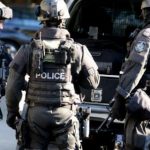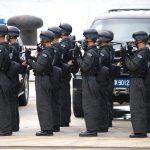Victoria Increases Police Powers and Removes Legal Safeguards

The recent weeks, the bulk of Victoria’s Justice Legislation Amendment (Terrorism) Bill 2018 has been enacted, which the state government claims will better protect the community against the threat of terrorism.
The changes include new powers for police to detain suspects without charge or a court order for up to four days, and to use lethal force.
Police are also allowed to detain children aged 14 years and over for up to 36 hours.
Expert panel’s recommendations
The laws are based on key recommendations by the government’s Expert Panel on Terrorism and Violent Extremism Prevention and Response Powers, which was led by former Police Commissioner Ken Lay.
The panel has, however, been criticised for being comprised of members strongly in favour of increased police and state powers at the expense of fundamental legal protections and safeguards of citizens.
Police fast becoming judges, jurors and executioners
Indeed, the laws give the police enormous discretion to determine who should be targeted, and have been criticised for undermining the separation of powers due to the lack of judicial oversight.
They allow police to detain a person for up to 14 days without charge if police say they suspect the person of planning a terrorist act that is “is capable of being carried out and could occur within 14 days.
New presumptions against the granting of bail for those who are charged with terrorism offences have also been enacted, diluting the presumption of innocence.
An additional $20m was earmarked in the in the Victorian Annual budget to implement the changes, much of which is going to the state’s police service.
And there’s more…
Police have also been given the power to use lethal force where they believe a terrorism incident is occurring, without being subjected to the same level of scrutiny as other killings.
They have also been given additional powers to cordon off areas, request proof of identity and search people and premises without the usual ‘reasonable suspicion’ of wrongdoing.
Following in the authoritarian footsteps of the ‘premier state’
The laws bring Victoria substantially in line with New South Wales, which has introduced a suite of laws in recent years to give police and state agents additional powers at the expense of individual freedoms – all in the name of protecting against the threat of terrorism.
The NSW laws include:
- providing immunity from both civil and criminal prosecution to law enforcement agents who conduct anti-terrorism raids, even if those raids are unjustified and the agents commit heinous crimes,
- removing the right against detention without charge through instruments such as ‘control orders’ and ‘preventative detention orders’,
- amending bail laws to enable those suspected of terrorism offences to be kept behind bars for years on little evidence,
- diluting the right to silence and even removing it altogether in certain cases,
- reversing the presumption of innocence for certain offences,
- bolstering the powers of regular police officers in a range of areas, including the power to arrest, to ‘shoot to kill’ with impunity if the police commissioner declares a ‘terrorist event’, and to search for firearms without a warrant.
As a further indication of law enforcement’s militarisation, more police officers are being equipped with semi-automatic weapons ostensibly to protect against the threat of terrorism.
But many question whether these powers will actually keep us safe – or whether the threat of terrorism is conveniently being used to unjustifiably bolster state control at the expense of important legal safeguards and valuable personal freedoms.








